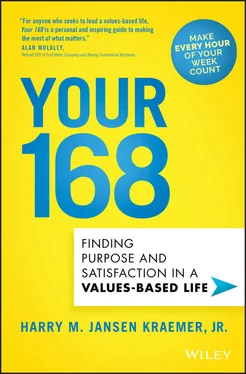There may be times, too, when your life gets out of balance and you can't (or won't) see it. You say that something is important (family, health, etc.), but your choices reflect the exact opposite. Someone close to you can give you the reality check you need by pointing out that your words and actions aren't aligned. You're trying to project one image, but your actions display something else—in the most extreme, you've become a Dr. Jekyll and Mr. Hyde story. That kind of feedback can be a wake-up call that gets you back on track quickly, living the kind of life that is true to who you are and what you value.
Research shows just how important these outside perspectives are. Tasha Eurich, an organizational psychologist and researcher, observed that just asking yourself why you did something (or failed to do something) is not sufficient because many people do not have access to their unconscious thoughts, feelings, and motives. To help them discern their behaviors and why they behave the way they do, Eurich writes that people need to seek out “honest feedback from loving critics.” 1 With this outside feedback and perspective, people can see themselves more clearly, which increases self-knowledge along with self-awareness. This kind of feedback, plus regular (ideally, daily) self-reflection by asking yourself probing questions, greatly enhances self-awareness.
RECALIBRATING YOUR LIFE BALANCE
I am often asked by students and executives alike: how do you know if you are really self-reflective and becoming self-aware? At the risk of being morbid, I tell the following story: imagine for a moment that after your annual physical, your doctor wants to meet with you. “I've been going through the results of your tests,” the doctor tells you, “and I'm going to be honest with you: you only have three days to live.”
Facing your imminent mortality, would you start feeling regret about what you wished you'd done differently? Are there people you've become estranged from? Do you regret broken relationships? Are you consumed with anger and resentment? Do you feel remorse for having taken advantage of someone? Then why not avoid all that now!
All of us are going to have three last days—we just don't know when they're going to be. Self-reflection helps us identify those areas in our lives we need to repair now. We own up to past mistakes, make amends where we can, forgive ourselves and others, and make the most of the time we have. Moving forward, we commit to treating people exactly as we would like to be treated (they don't call it the Golden Rule for nothing). Self-reflection can give you the peace of mind that you are sincerely trying to do the best you can every day, while being accountable to yourself for where and how you can do better.
Your life won't be perfect, but I guarantee it will get better. You will have more gratitude during the good times, because self-reflection will help you pause and be thankful. You'll have more peace of mind and clarity during challenging times, because you're committed to doing the right thing and doing the best you can do. Your worry, fear, anxiety, pressure, and stress will be greatly reduced, although not eliminated—welcome to being human! And there are folks who say a little bit of pressure may be helpful for getting things done. Unfortunately, that “little bit” of pressure can often become a lot and affect your health. But if you hunger for a life with more balance among those things that mean the most to you, self-reflection should become a regular habit.
Self-reflection isn't about perfection. You won't be perfectly balanced every day or even most days. We have busy lives and many things vie for our time and attention. Priorities change and challenges arise.
There is no formula or perfect answer to achieving life balance. It's a constant process of recalibration. Week to week as you look at your 168 hours, you'll see where you are in balance and out of balance. You'll make choices going forward to rebalance—more time with family, doing better with daily exercise, spending time with friends you haven't seen in a while. But our lives are too busy and complex to expect that we'll always be in balance. There will always be things that force us out of balance again.
Self-reflection, I've found, is the best foundation for creating and sustaining life balance. This is not the pursuit of perfection, but of greater self-awareness. When we know where and how we're spending our time, when things are going well or when we feel we're going off the rails, we can find a way forward.
NEXT STEPS TO BETTER BALANCE
In the pursuit of life balance, we're all works in progress. At the end of each chapter, starting here, I'll share some advice and exercises that can help you become more self-aware as you take active steps toward achieving better balance in support of your 168.
First-Time and Annual Self-Reflection Questions
As you engage in self-refection for the first time, ask yourself these questions to begin the process of regular self-examination. In addition, I use these same questions on my annual retreat:
What are my values?
What do I stand for?
What is my purpose?
What really matters?
How would I react if I was told I only had three days to live?
What kind of person do I want to be?
What kind of example do I want to be for others?
Daily Self-Examination Questions
As you engage in regular self-reflection, ask yourself questions that help you evaluate your day and think about how you spend your time. Here are the questions I use every day:
What did I say I was going to do today, in all dimensions of my life?
What did I actually do today?
What am I proud of?
What am I not proud of?
What example did I set for others?
What example did others set for me?
If I could live today over again, what would I do differently?
If I have tomorrow (and I am acutely aware that one day I won't), based on what I learned today, what will I do tomorrow in all dimensions of my life that are important to me?
1 1. Tasha Eurich, “What Self-Awareness Really Is (and How to Cultivate It),” Harvard Business Review, January 4, 2018.
Конец ознакомительного фрагмента.
Текст предоставлен ООО «ЛитРес».
Прочитайте эту книгу целиком, на ЛитРес.
Безопасно оплатить книгу можно банковской картой Visa, MasterCard, Maestro, со счета мобильного телефона, с платежного терминала, в салоне МТС или Связной, через PayPal, WebMoney, Яндекс.Деньги, QIWI Кошелек, бонусными картами или другим удобным Вам способом.












